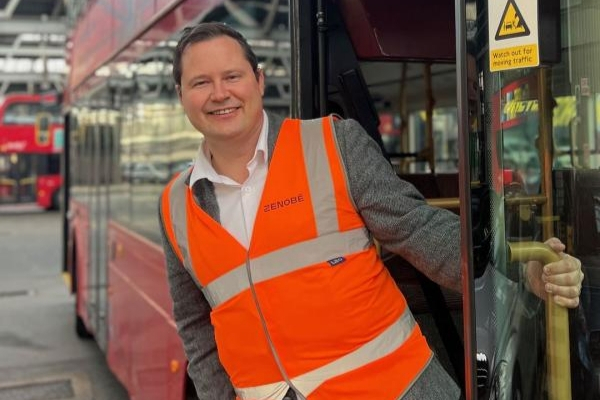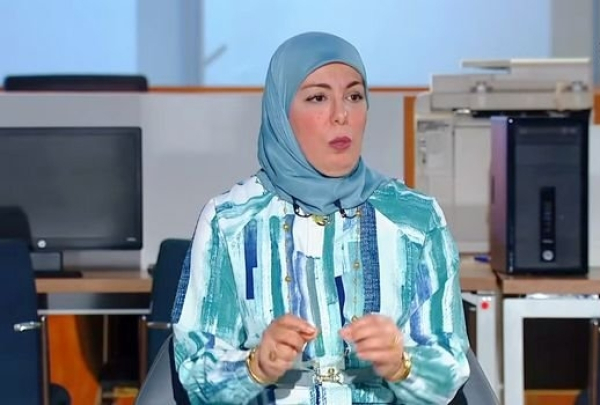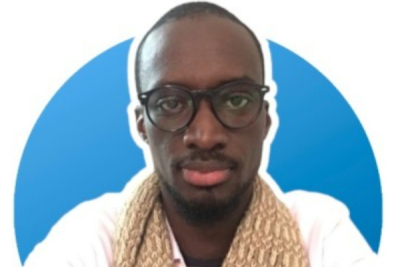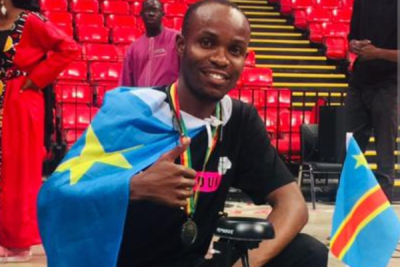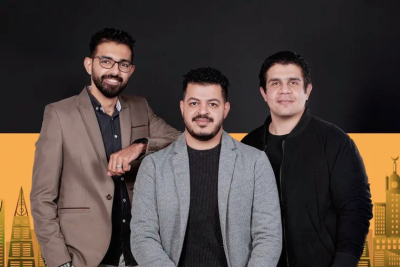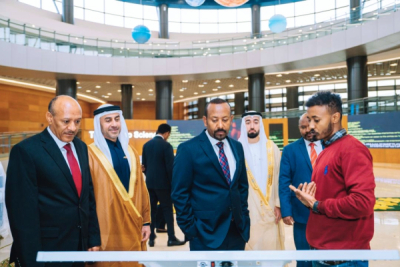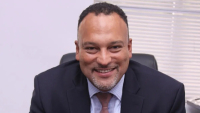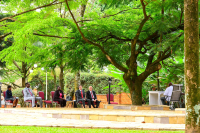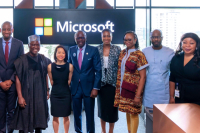He has extensive experience in planning and optimizing public transportation systems, as well as managing technology projects. He leads a company that provides advanced fleet management solutions.
Justin Coetzee is a trained civil engineer and a South African entrepreneur. He is the co-founder and CEO of GoMetro, a tech startup dedicated to enhancing commercial fleet operations. The company is based in the United Kingdom, with a development office in South Africa and sales offices in the United States and Latin America.
Founded in 2014, GoMetro provides its clients with GoMetro Bridge, a software platform that consolidates actionable data from all vehicles they wish to monitor. This platform enables clients to optimize operations and achieve cost savings in areas such as route planning, tire lifespan, and cargo management.
GoMetro Bridge integrates telematics data from an operator’s fleet and its subcontractors, regardless of the telematics provider. The company also offers ConnecTyre telematics sensors, which are mounted on wheel rims and provide real-time updates on tire conditions to the Bridge platform. This feature facilitates proactive tire monitoring, helping to prevent accidents and minimize downtime.
In 2020, GoMetro formed a partnership with the international bus operator Ascendal Group to launch GoAscendal, where Justin Coetzee served as director until 2023. The company has since rebranded as BetterRides.ai and offers a range of tools and solutions designed to assist bus and train operators in automating customer satisfaction surveys and passenger engagement reports.
Justin Coetzee earned his bachelor's degree in civil engineering from the University of Pretoria in 2007 and a master's degree in transportation engineering from Stellenbosch University in 2011.
From 2010 to 2012, he worked as a public transport engineer and planner at Aurecon, a design, engineering, and advisory firm. In 2012, he joined Element Consulting Engineers, where he served as an entrepreneur in residence until 2014.
Melchior Koba
In recent years, the Algerian government has prioritized accelerating the digitization process. To guide this transformation, the country is developing a comprehensive roadmap.
Algeria is set to implement a new digital transformation strategy, High Commissioner for Digitization Meriem Benmouloud said on Monday. The final draft was submitted to President Abdelmadjid Tebboune for approval in June.
The strategy, a first for the North African nation since independence, aims to shift from paper-based to digital management, increase transparency, reduce bureaucracy, broaden access to information, and boost economic performance while maintaining service quality.
The five-year plan, ending in 2029, is built on two pillars: a forthcoming digitization law and information and cybersecurity. The law will establish a regulatory framework for the digital sphere, streamline bureaucracy, and address technological gaps. The government will partner with the Ministry of National Defense to strengthen information and cybersecurity.
Tebboune has championed the digital transformation project as a driver of sustainable local development. Launched in 2019, the initiative has made significant progress in the past two years to overcome resource constraints, bureaucratic hurdles, and sector complexities.
Algeria's ICT development has accelerated, according to the latest International Telecommunication Union report. The country jumped 14 places in the ICT Development Index, ranking 88th out of 169 nations. Its score of 77.8 points surpassed African (47.4), Arab (74.5), and middle-income country (62) averages.
Samira Njoya
An IT professional by training, he ventured into the beauty and wellness sector. He created a management application designed to help beauty professionals digitize their entire value chain.
El Hadji M. Diagne (photo) is a Senegalese serial entrepreneur and IT engineer. He is the founder and CEO of Kiliya.co, a software company that provides a comprehensive management tool for beauty salons and spas.
Originally launched in 2015 as an online booking platform for beauty and wellness treatments, the startup evolved into Kiliya.co in 2023. It now offers an all-in-one management software for beauty professionals, including hair salons, beauty institutes, nail salons, and spas. This software provides a wide range of services to its users.
Kiliya allows users to manage, retain, and attract new clients. It facilitates quick customer payments, product management, appointment scheduling, stock management, and all administrative tasks of a salon. Additionally, it offers marketing tools to enhance salons' online visibility. With these features, the startup helps clients save time, maximize revenue, and increase productivity.
Before founding Kiliya.co, El Hadji M. Diagne co-founded Sun Telecom in 2013, an IT services company. He holds an engineering degree in information systems and computer networks, obtained in 2012 from the School of Higher Studies in Information Systems Engineering (HEISI) in Morocco.
From 2014 to 2016, El Hadji M. Diagne led the launch of the "My HealthLine" platform, a program by Orange Healthcare, the healthcare division of Orange Group. His mission was to connect doctors and patients to combat sexually transmitted diseases.
Melchior Koba
With a passion for emerging technologies like the Internet of Things, artificial intelligence, robotics, embedded systems, and industrial automation, he designs innovative solutions that drive efficiency and safety improvements for businesses.
Jeslone Lukisa (photo) is a Congolese inventor and entrepreneur, serving as the co-founder and CEO of Smaraf, a technology company established in 2018. Smaraf specializes in engineering, with a strong emphasis on security systems and technological integration.
The company offers a wide array of services, including the sales, installation, and maintenance of video surveillance systems, access control, alarms, fire systems, GPS trackers, electric fences, drones, IT solutions, telecommunications, and the Internet of Things (IoT). Smaraf also provides training in its areas of expertise.
Among the innovative solutions developed by Smaraf are the Smaraf Asset Checking Table, Fuel Management System, and Driver Monitoring System. The Smaraf Asset Checking Table leverages radio frequency identification technology to help businesses track and verify their laptops, optimizing IT asset management.
The Fuel Management System is designed to monitor and enhance fuel usage, providing effective oversight and optimization to help industries improve efficiency and profitability. Meanwhile, the Driver Monitoring System employs vision and artificial intelligence to analyze driver behavior in real time, helping to prevent accidents caused by drowsiness, distraction, and other hazardous practices.
Jeslone Lukisa holds an engineering degree in electromechanics from the University of Kolwezi, which he obtained in 2020. Since 2021, Smaraf takes part in the Pan-African Robotics Competition. His team, Smaraf Eduk, secured second place in both 2021 and 2022, and won the competition in 2023. They are currently participating in the final phase of the 2024 edition, which began in Dakar on Monday, July 22, and will conclude on Saturday, July 27.
Melchior Koba
Kemitt, Egypt's top e-commerce platform for furniture and home accessories, has expanded into Saudi Arabia following a recent undisclosed funding round, according to a press release dated July 22.
Founded in 2017, Kemitt connects product and furniture designers with consumers, managing manufacturing, overheads, and last-mile logistics. The platform offers on-demand manufacturing and 7-12 day delivery services.
The recent funding supports Kemitt’s growth plans, including technology upgrades, product expansion, local partnerships, and its Saudi entry.
In the face of the digital revolution, African nations are ramping up initiatives to equip their populations, particularly young people, with essential digital skills. Mastering these competencies is becoming increasingly indispensable in today's world.
On Tuesday, July 23, Ethiopian Prime Minister Abiy Ahmed (photo, center) launched the "5 Million Ethiopian Coders" program. Supported by the United Arab Emirates, this initiative aims to provide digital training to 5 million young Ethiopians, including 50% women, by 2026.
The training program focuses on areas such as programming, Android app development, data science, and fundamental digital skills in artificial intelligence. It will last between 6 and 7 weeks and will culminate in certification for participants.
"Ethiopia has hope through a forward-thinking youth population. The 5 Million Ethiopian Coders Initiative we launch today is a great opportunity and I call upon everyone to encourage the youth to register for the program, gain skills, and acquire international certification," wrote Prime Minister Abiy Ahmed on X (Formerly Twitter).
This initiative is an adapted version of the "One Million Arab Coders" program conducted in Dubai and initiated at the 2017 World Economic Forum by Sheikh Mohammed Bin Rashid Al Maktoum, Vice President, Prime Minister, and Ruler of Dubai. The Ethiopian version of the program is part of the "Digital Ethiopia 2025" plan, aimed at leveraging digital opportunities to propel the country towards a knowledge and innovation-based economy.
With over 128 million inhabitants, a significant portion of whom are young, Ethiopia faces a digital divide that prevents its population from reaping the benefits of digital growth. In the era of the technological revolution, the country must equip this young generation with the necessary skills for future jobs.
Adoni Conrad Quenum
Cofinity Group, a 15-year veteran in the data center market, has signed strategic partnership agreements with Africa's largest data center operators, the group announced on July 23.
They include PAIX Data Centres, Rack Centre, Raxio, and Digital Realty's African subsidiaries iColo, Teraco, and Digital Realty Nigeria. These data center providers account for over 75% of Sub-Saharan Africa's GDP.
Cofinity’s extensive experience and relationships with these operators offer significant opportunities for enterprises seeking quality colocation data center solutions in Africa.
The Data Governance in Africa initiative has introduced the “Think Like an Investor” accelerator program, inviting African innovators to submit their digital social innovations for tailored training support.
The program targets data-driven startups and small to medium-sized enterprises in South Africa, Botswana, Tanzania, Zambia, Namibia, Kenya, and Senegal. It aims to foster a human-centric data economy in Africa.
Applications close on August 4.
The adoption of technologies such as AI in health interventions signals progress towards modernizing Africa's health infrastructure. This not only helps in fighting diseases but also positions Africa as a growing hub for technological innovation.
President Yoweri Museveni met with Israeli businessmen Israel Green and Koby Shushan to discuss innovative projects for Uganda, the State House Uganda announced on July 18. The meeting focused on using Artificial Intelligence (AI) through Malera Technologies Limited to combat malaria.
President Museveni met Israeli business leaders Israel Green & Koby Shushan at Nakasero State Lodge. They discussed; Combating Malaria with AI technologies, enhancing tourism with the Ruwenzori Cable Car project & Launching a Ka-Band satellite for rural connectivity. pic.twitter.com/uRly05h2HU
— State House Uganda (@StateHouseUg) July 18, 2024
The initiative will employ the Sterile Insect Technique (SIT), an environmentally friendly pest control method that involves large-scale rearing of the target pest followed by sterilization using radiation. SIT has proven successful in countries like Israel and the United States, and it has been approved by Uganda's Ministry of Health.
The discussions covered both the project's budget and timeline. President Museveni directed the immediate allocation of a portion of the current budget towards the project, with additional funding to come from Israel's support program. A follow-up meeting with the Ministry of Finance will delve deeper into financing options.
The World Malaria Report 2020 by the WHO shows that Sub-Saharan Africa bears a disproportionate malaria burden, with 95% of cases and 96% of deaths globally in 2020. In Uganda, malaria is the leading cause of illness and death, particularly affecting children under five, according to the Ministry of Health's National Malaria Control program.
This move aligns with the regional strategy for malaria elimination endorsed by the Government of Uganda (GoU). The project reflects a strategic approach to leveraging technology and innovation for sustainable development.
Hikmatu Bilali
Several global technology companies are increasingly viewing Nigeria as a strategic hub for their African expansion, particularly in the West African sub-region.
American tech giant Microsoft has decided to reduce its presence in Nigeria. According to a Techcabal article published on Friday, July 19, "Microsoft will reduce its office space at the Kings Tower building in Ikoyi from six floors to two, suggesting a scaleback in its Nigerian operations."
This decision follows a wave of layoffs in its engineering team in May and July 2024. Additionally, Microsoft has announced the closure of its African Development Center, which was inaugurated in March 2022 in Lagos. The center aimed to develop technological and engineering solutions for Africa and the world.
"While we have made the difficult decision to close the Africa Development Centre in Nigeria, we want to emphasize that this move does not diminish our commitment to Nigeria and the region," Microsoft explained.
The reduction of Microsoft's activities in Nigeria can be attributed to the economic instability in the country, marked by the depreciation of the local currency and the accelerating rise in prices. Many companies operating in the country are reorganizing their presence to cope with this economic climate.
Meta, the parent company of Facebook and WhatsApp, is following a similar path. After laying off about thirty employees from its Nigerian team, the Menlo Park firm indicated it is reassessing its office spaces to ensure they meet the company's needs.
Adoni Conrad Quenum
More...
This startup's name translates to "save" in Moore, a widely spoken language in Burkina Faso. Its goal is to address parcel delivery issues across various localities in the country.
Faangué is a technological solution developed by Kafyka Group, a company based in Burkina Faso. It allows users to order domestic gas delivery with just a few clicks. The startup, founded in 2023 by Brice Clovis Kaboré, is located in Ouagadougou.
According to Kaboré, Faangué "aims to create jobs, enhance the delivery profession through the use of ICT, establish a uniform delivery price throughout Burkina Faso, encourage the population to integrate digital aspects into their daily habits, and assist the government in achieving its objectives."
The app is currently available exclusively on Android. After downloading, users can create an account to access various services. To order a gas cylinder, they simply select one of the many merchants listed on the platform, choose the desired cylinder, and confirm their order. Before finalizing the order, users can review an invoice that details the product price, delivery fees, and information about the delivery person.
In addition to gas delivery, users can hire the startup's couriers for errands. The app highlights nearby couriers based on the user's location. Faangué provides an estimate of the distance in kilometers between the user and available couriers, allowing users to select one for their errands.
The startup aims to create approximately 200 permanent jobs and over 5,000 part-time delivery positions for various products across Burkina Faso. It operates in several major cities, including Ouagadougou, Bobo-Dioulasso, and Koudougou.
Adoni Conrad Quenum
A passionate advocate for tackling environmental issues in Africa, he leverages his technical expertise to bridge the gap between independent waste collectors and businesses/households.
Martin Tumusiime (photo) is a Ugandan computer scientist and tech entrepreneur, known for founding and serving as the CEO of Yo-Waste, an innovative technology-based waste management company. Established in 2018, Yo-Waste aims to transform waste collection and management in Africa through advanced solutions.
Yo-Waste offers an application that connects residential and commercial clients with local waste collectors, enabling users to quickly find nearby waste services. Once the waste is collected, Yo-Waste partners with a network of collaborators to dispose of, recycle, repurpose, or convert it into energy.
"We had some people who used to collect our garbage, but it would take at least a week. Now with Yo-Waste, it takes only three days. The app's efficiency not only ensures timely waste disposal but also prevents waste from being scattered by wind and vultures, promoting cleaner surroundings," explains Martin Tumusiime.
In addition to Yo-Waste, Tumusiime founded UgTechMag, a technology magazine that provides guides and advice on tech products and services for audiences in Uganda, Kenya, Nigeria, and beyond.
Tumusiime holds a degree in computer science from Makerere University, which he obtained in 2020. From 2022 to 2023, he worked as a consultant for the German International Development Cooperation Agency (GIZ), where he managed a team that developed a robust waste collection application for Gulu City in collaboration with the Gulu City Council.
Melchior Koba
Digital progress is critical for Africa's development, providing numerous benefits to the broader economic landscape. Efforts to increase internet penetration in Africa are vital for connecting rural communities, enhancing social outcomes, fostering economic growth, and improving governance.
Liberian President Joseph Nyuma Boakai, Sr. held a virtual meeting with Elon Musk, entrepreneur and CEO of SpaceX, the operator of Starlink. The Executive Mansion announced the meeting in a release dated July 21.
During the meeting, President Boakai emphasized the value of such engagements for building long-term relationships and improving Liberia’s key sectors through technology. He highlighted the potential of tech collaborations to enhance service delivery and support Liberia’s youth.
Musk discussed the Starlink program’s impact on education and healthcare, noting how improved internet access could benefit rural communities. He expressed support for advancing these initiatives while President Boakai welcomed the discussion as a significant step in fostering international partnerships and invited Musk to visit Liberia.
According to Datareportal, as of 2024, Liberia has about 1.65 million internet users, representing 30.1 % of the total population, showing a notable increase from previous years. The country also has around 859,000 active social media users, indicating growing engagement and connectivity among its citizens.
This discussion represents a crucial step in enhancing international partnerships and harnessing technological innovation, aligning with the Government’s ARREST (Agriculture, Roads, Rule of Law, Education, Sanitation, & Tourism) Agenda.
Hikmatu Bilali
The Economic Community of West African States (ECOWAS) has announced its Cybersecurity Hackathon, inviting participants to showcase their skills and tackle real-world cybersecurity challenges.
Organized by ECOWAS, Nigeria’s Federal Ministry of Communications, Innovation and Digital Economy, and the National Information Technology Development Agency (NITDA), the Hackathon is a yearly ethical hacking competition that unites top cybersecurity talents from across ECOWAS. It offers a distinct platform to demonstrate skills, foster knowledge sharing, and advance excellence in cybersecurity.
Registration closes by August 5.


